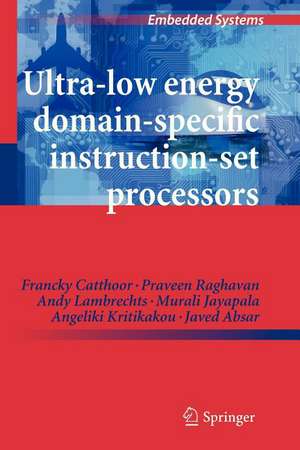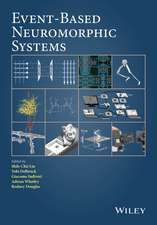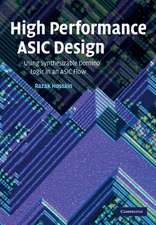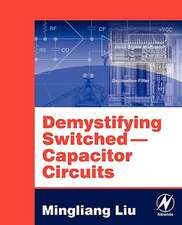Ultra-Low Energy Domain-Specific Instruction-Set Processors: Embedded Systems
Autor Francky Catthoor, Praveen Raghavan, Andy Lambrechts, Murali Jayapala, Angeliki Kritikakou, Javed Absaren Limba Engleză Paperback – 13 oct 2012
In the complex, global design of battery-operated embedded systems, the focus of Ultra-Low Energy Domain-Specific Instruction-Set Processors is on the energy-aware architecture exploration of domain-specific instruction-set processors and the co-optimization of the datapath architecture, foreground memory, and instruction memory organisation with a link to the required mapping techniques or compiler steps at the early stages of the design. By performing an extensive energy breakdown experiment for a complete embedded platform, both energy and performance bottlenecks have been identified, together with the important relations between thedifferent components. Based on this knowledge, architecture extensions are proposed for all the bottlenecks.
| Toate formatele și edițiile | Preț | Express |
|---|---|---|
| Paperback (1) | 950.66 lei 6-8 săpt. | |
| SPRINGER NETHERLANDS – 13 oct 2012 | 950.66 lei 6-8 săpt. | |
| Hardback (1) | 956.81 lei 6-8 săpt. | |
| SPRINGER NETHERLANDS – 22 aug 2010 | 956.81 lei 6-8 săpt. |
Din seria Embedded Systems
- 20%
 Preț: 312.03 lei
Preț: 312.03 lei - 20%
 Preț: 411.16 lei
Preț: 411.16 lei - 15%
 Preț: 634.68 lei
Preț: 634.68 lei - 23%
 Preț: 456.63 lei
Preț: 456.63 lei - 15%
 Preț: 646.11 lei
Preț: 646.11 lei - 15%
 Preț: 697.65 lei
Preț: 697.65 lei - 18%
 Preț: 946.55 lei
Preț: 946.55 lei - 20%
 Preț: 532.91 lei
Preț: 532.91 lei - 15%
 Preț: 693.06 lei
Preț: 693.06 lei - 18%
 Preț: 783.81 lei
Preț: 783.81 lei - 18%
 Preț: 784.79 lei
Preț: 784.79 lei - 32%
 Preț: 303.94 lei
Preț: 303.94 lei - 20%
 Preț: 700.08 lei
Preț: 700.08 lei - 15%
 Preț: 643.48 lei
Preț: 643.48 lei - 18%
 Preț: 789.35 lei
Preț: 789.35 lei - 15%
 Preț: 585.27 lei
Preț: 585.27 lei -
 Preț: 387.75 lei
Preț: 387.75 lei - 24%
 Preț: 786.94 lei
Preț: 786.94 lei - 18%
 Preț: 833.09 lei
Preț: 833.09 lei - 15%
 Preț: 648.24 lei
Preț: 648.24 lei - 33%
 Preț: 988.97 lei
Preț: 988.97 lei - 18%
 Preț: 943.73 lei
Preț: 943.73 lei -
 Preț: 447.89 lei
Preț: 447.89 lei - 15%
 Preț: 641.71 lei
Preț: 641.71 lei - 15%
 Preț: 641.71 lei
Preț: 641.71 lei - 15%
 Preț: 643.34 lei
Preț: 643.34 lei - 15%
 Preț: 640.06 lei
Preț: 640.06 lei
Preț: 950.66 lei
Preț vechi: 1159.34 lei
-18% Nou
Puncte Express: 1426
Preț estimativ în valută:
181.90€ • 190.44$ • 150.52£
181.90€ • 190.44$ • 150.52£
Carte tipărită la comandă
Livrare economică 05-19 aprilie
Preluare comenzi: 021 569.72.76
Specificații
ISBN-13: 9789400733060
ISBN-10: 9400733062
Pagini: 428
Ilustrații: XXII, 406 p.
Dimensiuni: 155 x 235 x 22 mm
Greutate: 0.59 kg
Ediția:2010
Editura: SPRINGER NETHERLANDS
Colecția Springer
Seria Embedded Systems
Locul publicării:Dordrecht, Netherlands
ISBN-10: 9400733062
Pagini: 428
Ilustrații: XXII, 406 p.
Dimensiuni: 155 x 235 x 22 mm
Greutate: 0.59 kg
Ediția:2010
Editura: SPRINGER NETHERLANDS
Colecția Springer
Seria Embedded Systems
Locul publicării:Dordrecht, Netherlands
Public țintă
ResearchCuprins
Global State-of-the-Art Overview.- Energy Consumption Breakdown and Requirements for an Embedded Platform.- Overall Framework for Exploration.- Clustered L0 (Loop) Buffer Organization and Combination with Data Clusters.- Multi-threading in Uni-threaded Processor.- Handling Irregular Indexed Arrays and Dynamically Accessed Data on Scratchpad Memory Organisations.- An Asymmetrical Register File: The VWR.- Exploiting Word-Width Information During Mapping.- Strength Reduction of Multipliers.- Bioimaging ASIP benchmark study.- Conclusions.
Textul de pe ultima copertă
Modern consumers carry many electronic devices, like a mobile phone, digital camera, GPS, PDA and an MP3 player. The functionality of each of these devices has gone through an important evolution over recent years, with a steep increase in both the number of features as in the quality of the services that they provide. However, providing the required compute power to support (an uncompromised combination of) all this functionality is highly non-trivial. Designing processors that meet the demanding requirements of future mobile devices requires the optimization of the embedded system in general and of the embedded processors in particular, as they should strike the correct balance between flexibility, energy efficiency and performance. In general, a designer will try to minimize the energy consumption (as far as needed) for a given performance, with a sufficient flexibility. However, achieving this goal is already complex when looking at the processor in isolation, but, in reality, the processor is a single component in a more complex system. In order to design such complex system successfully, critical decisions during the design of each individual component should take into account effect on the other parts, with a clear goal to move to a global Pareto optimum in the complete multi-dimensional exploration space.
In the complex, global design of battery-operated embedded systems, the focus of Ultra-Low Energy Domain-Specific Instruction-Set Processors is on the energy-aware architecture exploration of domain-specific instruction-set processors and the co-optimization of the datapath architecture, foreground memory, and instruction memory organisation with a link to the required mapping techniques or compiler steps at the early stages of the design. By performing an extensive energy breakdown experiment for a complete embedded platform, both energy and performance bottlenecks have been identified, together with the important relations between thedifferent components. Based on this knowledge, architecture extensions are proposed for all the bottlenecks.
In the complex, global design of battery-operated embedded systems, the focus of Ultra-Low Energy Domain-Specific Instruction-Set Processors is on the energy-aware architecture exploration of domain-specific instruction-set processors and the co-optimization of the datapath architecture, foreground memory, and instruction memory organisation with a link to the required mapping techniques or compiler steps at the early stages of the design. By performing an extensive energy breakdown experiment for a complete embedded platform, both energy and performance bottlenecks have been identified, together with the important relations between thedifferent components. Based on this knowledge, architecture extensions are proposed for all the bottlenecks.
Caracteristici
A systematic methodology for exploiting word-width information in embedded compilers Software method to enable heterogeneous data parallelism (SIMD) Technique for a context-driven strength reduction for constant multiplications, including a trade-off with application accuracy requirements Includes supplementary material: sn.pub/extras











